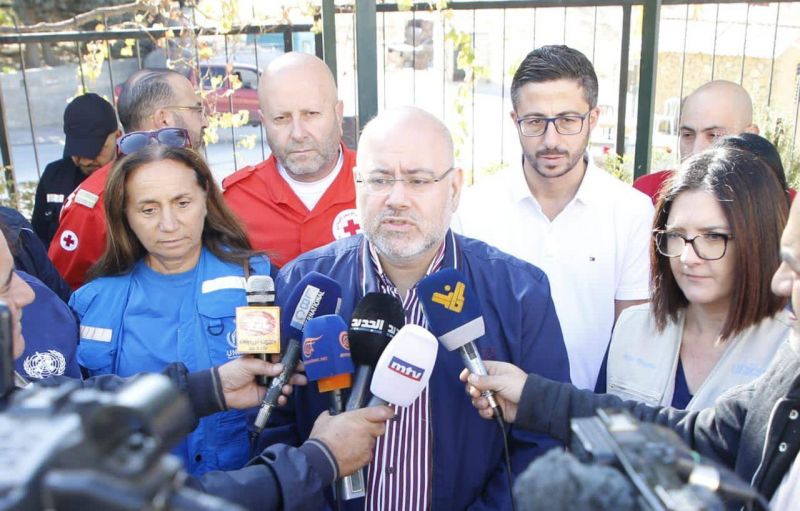
Caretaker Lebanese Health Minister Firas Abiad during a tour in the Bekaa, Oct. 23, 2022. (Credit: Courtesy of Sarah Abdallah)
BEIRUT — Traces of cholera were found in water samples from three sources in the neighborhood of Bab al-Tabbaneh in Tripoli in North Lebanon, the Ministry of Health announced Sunday. Although the Ministry of Health had reported these were public water sources, the North Lebanon Water Establishment (NLWE) has denied these are public water sources and has said the samples were taken from a private well equipped by a private company and not monitored by the government.
According to NLWE's Technical Department Director Gaby Nasr, the contaminated source of water is for a private well, Sabeel, and not from the network of water wells from NLWE. The Sabeel water well was closed by authorities Saturday evening, according to Nasr.
L'Orient Today tried to reach out to three sources at the Ministry of Health and the Health Minister on Sunday, but they could not be reached for comment.
On Sunday, caretaker Minister of Health Firas Abiad toured the Bekaa to assess the situation in the region, while the total number of deaths due to the epidemic reached ten and the number of contaminations 239 according to the latest report on Saturday.
Accompanied by a delegation of international organizations, Abiad visited the first aid center in Arsal, as well as a water treatment plant funded by the Qatari Red Crescent, where he held a press conference, according to L'Orient Today's correspondent. He was also scheduled to visit a Syrian refugee settlement in Qab Elias and the Doctors Without Borders hospital in Bar Elias in the Bekaa region.
Abiad thanked the Qatari Red Crescent for setting up the water treatment plant, saying that it currently provides 40,000 liters of drinking water and that work is underway to expand it to provide 80,000 liters so that it can supply 137 camps instead of the current 87.
"The cases of cholera in Arsal and the Bekaa remain low, and the projects currently being carried out in cooperation with our allies aim to address this issue quickly so that the sick do not need to be hospitalized," said the minister.
Abiad called again for the establishment of a field hospital in Arsal, lamenting that this locality near the border with Syria has no facility and that the nearest government hospital is 40 kilometers away.
"We need to find solutions for cholera patients, and this pushes us to establish a government hospital here. This is an old project that never saw the light of day," he added.
Abiad also recalled that "unfortunately, refugees are forced to use unsafe water," with refugee numbers in Lebanon estimated at approximately 1.5 million Syrian refugees, according to the UN Refugee Agency (UNHCR). Although many of the cases have been recorded "among refugees," there has been "an increase in cases among Lebanese," Abiad said a few days ago.
Recently, the World Health Organization announced that tests of wastewater carried out in Ain al-Mreisseh in Beirut, in the Ghadir station and in Bourj Hammoud in Mount Lebanon confirmed the presence of traces of cholera. For WHO, this indicates that this acute diarrheal infection, caused by ingestion of food or water contaminated with the Vibrio cholerae bacterium, has spread to two other areas of the country located far from the first confirmed cases in Akkar, North Lebanon.
Additional reporting by Sarah Abdallah
Clarification: An earlier version of this article stated the Ministry of Health had detected cholera in three public water sources. The North Lebanon Water Establishment has denied these are public, stating they are private water wells.